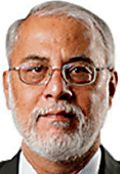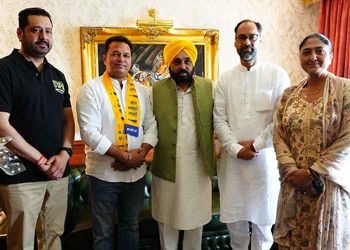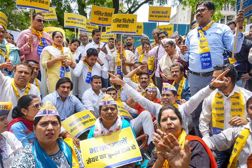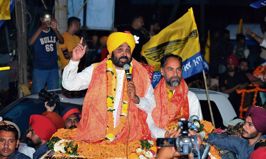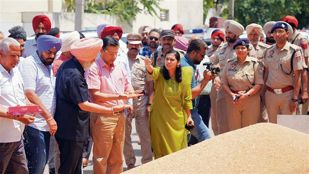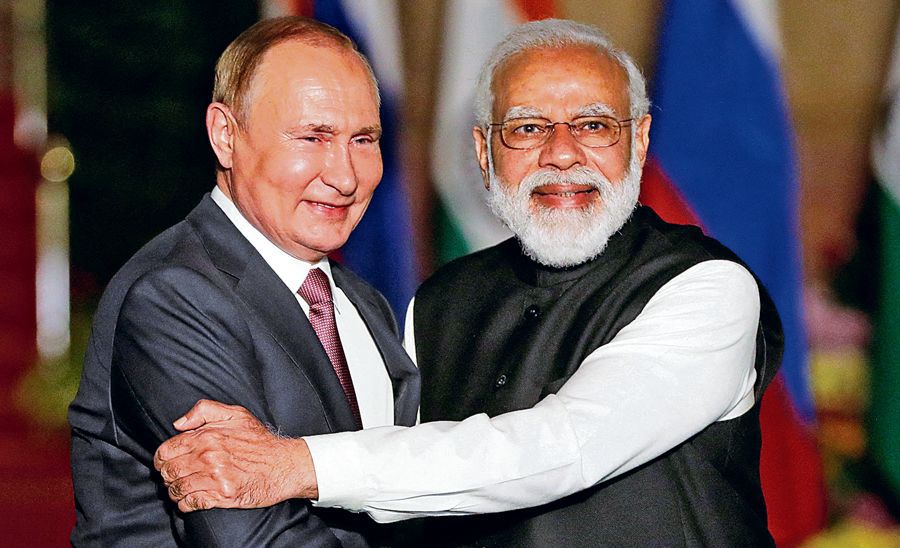
Steadfast: Despite Western pressure, India has refused to acquiesce to the sanctions on Russia. Reuters
Distinguished Fellow, Observer Research Foundation, New Delhi
LAST Wednesday, Prime Minister Narendra Modi spoke separately on the phone to two Presidents — Russia’s Vladimir Putin and Ukraine’s Volodymyr Zelenskyy. His message was that there was a need for “an early end to the ongoing conflict”.
The path to a final settlement will be long and arduous, and perhaps India may find that it needs to play an even greater role.
Reports say that the first call was to Putin to congratulate him on his re-election as the President and this was followed by the call to Zelenskyy, expressing India’s desire to “do everything within its means to support a peaceful solution” to the Ukraine issue.
The tone and tenor of both conversations, as reported by their respective governments or through posts by the principals on X (formerly Twitter), suggest that Modi and India remain credible interlocutors with both Russia and Ukraine and could emerge as peacemakers in the war that has deeply damaged both countries and has had negative global consequences.
Earlier, there had been initiatives by Turkey and China to promote a ceasefire and negotiations between Ukraine and Russia, but little came out of them. But the situation now has changed. The Russians are on the offensive, while support to Ukraine is wavering in the US and Europe. The prospect of a Donald Trump victory is compounding this situation, given what many believe is his inclination to stop additional expenditure in backing Kyiv.
In these circumstances, Modi’s suggestion that India may be willing to play a role in bringing the conflict to a close is a significant one. Having headed India for the past decade, Modi is now an established international figure, especially since his government has adopted foreign policy positions that would add heft to a peacemaking initiative.
From the outset, India has adopted a path of a ‘Russia-leaning’ neutrality in the Ukraine war and despite Western pressure, refused to acquiesce to the sanctions on Russia. Indeed, it provided a lifeline of sorts for Moscow by purchasing ever larger quantities of its oil. Though it has faced criticism from the West and Ukraine, the current stalemate on the warfront has probably led to a reassessment of the Indian position in Kyiv. Recently, NSA Ajit Doval held telephonic consultations with Andriy Yermak, head of the Ukrainian President’s office; later this week, New Delhi will host Ukrainian Foreign Minister Dmytro Kuleba.
Both Ukraine and Russia have suffered huge losses and the war has reached a point where any kind of military breakthrough by either side looks like an unlikely prospect. According to some estimates, the Russian death toll is around 75,000, while Ukraine’s fatalities are reportedly in excess of 60,000. They have also lost thousands of tanks, armoured combat vehicles, helicopters and artillery pieces.
Initial Russian bungling and Western help enabled Ukraine to recover large tracts of territory it had lost since February 2022. But now, advances have stalled and the Ukrainian counter-offensive of last summer did not achieve much. Currently, US aid remains blocked and this will impact Ukraine’s ability to use superior Western equipment to offset Russian strength. The Europeans are scrambling to fill the gaps, but it will be years before they can be an effective replacement for the Americans.
By itself, Ukraine cannot indefinitely fight the Russians who, after initial blunders, have got their act together in terms of tactics and equipment. Their economy, which was predicted to collapse following Western sanctions, is doing well. With their larger manpower pool, they remain willing to expend more troops than Ukraine. A touch of war weariness has crept into Ukraine, which has no answer to the current Russian tactics.
The clamour for a negotiated settlement to the war is growing. This needs to take place when both adversaries are relative equals, rather than when one is clearly seen as being vanquished. As of now, it should be clear that the Ukrainians can fight on and despite all their shortages, the Russians have not found the going easy. But for how long and at what cost can this continue?
What the war has done is remove any doubt about the Ukrainian identity, which has now clearly emerged and taken a sharp anti-Russian turn. Effectively, it is the ‘forward edge’ of European defence against Russia.
In these circumstances, a possible settlement can be attempted. Perhaps the most dramatic suggestion came from Pope Francis, who urged Ukraine to have the courage to negotiate under the ‘white flag’. Many US Republican Senators, including Marco Rubio, are also signalling that a negotiated settlement may be necessary to end the Ukraine war.
Both principals — Russia and Ukraine — reject negotiations at present. While Russia wants to end the war by freezing the ceasefire line, Ukraine, not surprisingly, rejects this. Currently, Russia controls 22 per cent of Ukrainian territory, including the land it occupied in 2014.
Switzerland has told the UN that it intends to organise a high-level Ukraine peace conference in the summer this year. While Ukraine has evinced interest in it, it is not clear whether Russia would be willing to participate. Reports suggest that the Swiss are roping in China to push Moscow to participate.
This is where India — and Modi — can play a major role in pushing both sides to attend the peace conference. Getting the conference going with both participating will be a beginning, and India certainly has much greater credibility as an interlocutor with the two parties than China. The path to a final settlement will be long and arduous, and perhaps New Delhi may find that it needs to play an even greater role. But the important point, as of now, is to make a beginning.
Join Whatsapp Channel of The Tribune for latest updates.






